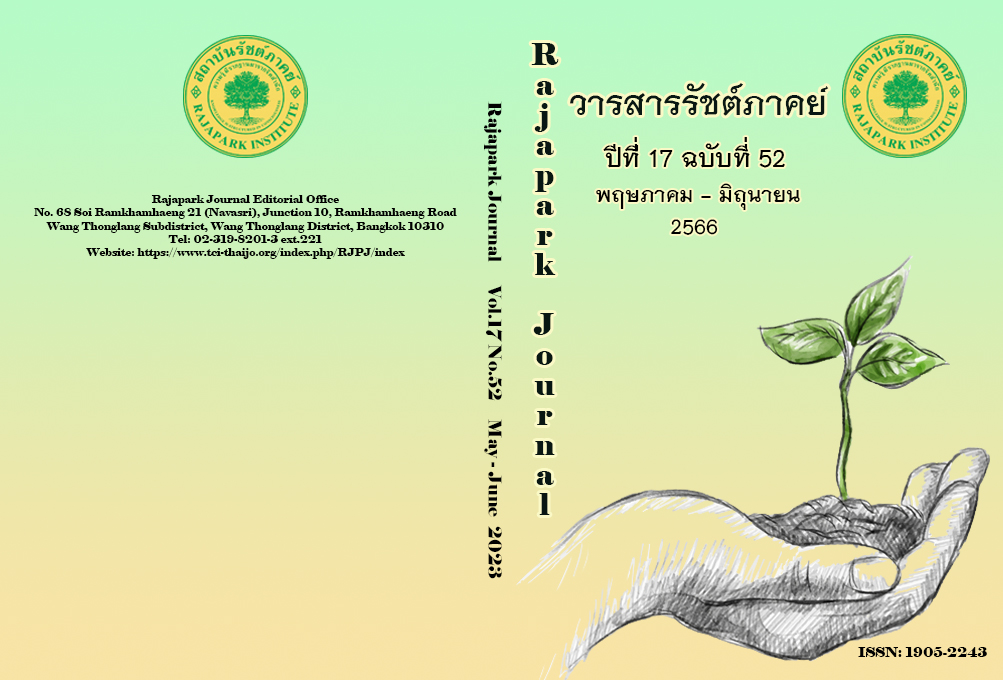CRRU Model: 21st Century Skills Development Model Through The Management of Learning Based on the Quest for Knowledge
Main Article Content
Abstract
The research objective is to develop a model for developing 21st century skills through inquiry-based learning management, and an experimental teaching with 5 groups of 3rd year student teachers of the Faculty of Education, totaling 125 people. The research findings were as follows: The results of the research revealed that 1) The integrated teaching and learning model developed under the name CRRU Model was developed with 4 components, namely: (1) CCII principles are 1) Connectivism; 2) Collaboration Learning; 3) Integrative; and 4) Innovation. (2) Objectives of the teaching model to be used for the development of learners cover 5 learning areas: Ethics and Moral, Knowledge, Cognitive Skills, Interpersonal Skills and Responsibility and Numerical Analysis, Communication and Information Technology Skills. (3) The teaching and learning process of the CRRU Model consists of 4 steps: 1. Stage C: Content & Competency 2. Stage R: Research & Relationship 3. Stage R: Report & Reflection and 4. Stage U: Up to Online. The last component, (4) Measurement and Evaluation consists of measuring and evaluating during learning and after learning management. 2) The evaluation results of using the CRRU model found that learners’ 21st century skills after the experiment were higher than before the experiment at statistical significance at the .01 level.
Article Details

This work is licensed under a Creative Commons Attribution-NonCommercial-NoDerivatives 4.0 International License.
Views and opinions appearing in the Journal it is the responsibility of the author of the article, and does not constitute the view and responsibility of the editorial team.
References
Berry, B. (2010). The teachers of 2030: Creating a student-centered profession for the 21st century. MetLife Foundation. http://www.bcpsea.bc.ca/documents/research_articles/TS2030.pdf
Black, R. (2009). English-language learners, fan communities, and 21st-century skills. Journal of Adolescent & Adult Literacy, 52(8), 688–697.
Chu, S. K. W., & Kennedy, D. M. (2011). Using online collaborative tools for groups to co-construct knowledge. Online Information Review, 35(4), 581-597.
Chu, S. K. W., Tavares, N. J., Chu, D., Ho, S. Y., Chow, K., Siu, F. L. C., & Wong, M. (2012). Developing upper primary students’ 21st century skills: Inquiry learning through collaborative teaching and Web 2.0 technology. Hong Kong: Centre for Information Technology in Education, Faculty of Education, The University of Hong Kong.
Coyle, J. (2007). Wikis in the college classroom: A comparative study of online and face to face group collaboration at a private liberal arts University[Unpublished Doctoral dissertation, Kent State University].
Dede, C. (2009). Immersive interfaces for engagement and learning. Science, 323(5910), 66-69.
Delors, J. et al. (1996). Learning: The treasure within. UNESCO. http://unesdoc.unesco.org/images/0010/001095/109590eo.pdf
Dewey, J. (1916). Democracy and education. The Free Press.
Dochy, F., Segers, M., Van den Bossche, P., & Gijbels, D. (2003). Effects of problem-based learning: A meta-analysis. Learning and Instruction, 13(5), 533–556.
Dunning, J. H. (2000). Regions, globalization, and the knowledge economy: Issues stated. In J. H. Dunning (Ed.), Regions, globalization, and the knowledge-based economy. Oxford University Press.
Fung, K. Y., Chu, S. K. W., Tavares, N., Ho, G., & Kwan, K. (2011). Using Google sites in English collaborative writing. In Paper presented at CITE Research Symposium 2011, The University of Hong Kong.
Harel, I. E., & Papert, S. E. (1991). Constructionism. Ablex Publishing.
Hmelo-Silver, C. E. (2004). Problem-based learning: What and how do students learn?. Educational Psychology Review, 16(3), 235–266.
Hmelo-Silver, C. E., Derry, S. J., Bitterman, A., & Hatrak, N. (2009). Targeting transfer in a STELLAR PBL course for pre-service teachers. Interdisciplinary Journal of Problem-based Learning, 3(2), 4.
Kafai, Y. B., Peppler, K., & Chiu, G. (2007). High tech programmers in low income communities: Seeding reform in a community technology center. In C. Steinfield., B. Pentland., M. Ackerman & N. Contractor (Eds.), Communities and technologies 2007 (pp. 545–564). Springer.
Kuhlthau, C. C., Caspari, A. K., & Maniotes, L. K. (2007). Guided inquiry: Learning in the 21st century. Libraries Unlimited.
Lee, J. J., & Hammer, J. (2011). Gamification in education: What, how, why bother?. Academic Exchange Quarterly, 15(2), 146.
Mak, B., & Coniam, D. (2008). Using wikis to enhance and develop writing skills among secondary school students in Hong Kong. System, 36(3), 437–455.
Notari, M. (2006). How to Use a Wiki in Education: ‘Wiki based Effective Constructive Learning’. Wikisym 2006: International Symposium on Wikis Odense DK. 131-132. http://www.wikisym.org/ws2006/proceedings/p131.pdf
Pifarre, M., & Kleine Starrman, J. (2011). Wiki-supported collaborative learning in primary education: How a dialogic space is created for thinking together. International Journal of Computer-Supported Collaborative Learning, 6(2), 187–205.
Reynolds, R., & Chiu, M. M. (2015). Reducing digital divide effects through student engagement in coordinated game design, online resource uses, and social computing activities in school. Journal of the Association for Information Science and Technology (JASIST).
DOI: 10.1002/asi.23504
Reynolds, R., & Harel Caperton, I. (2011). Contrasts in student engagement, meaning-making, dislikes, and challenges in a discovery-based program of game design learning. Journal of Educational Technology Research and Development, 59(2), 267–289.
Richardson, W. (2006). Blogs, wikis, podcasts and other powerful web tools for classrooms. Corwin Press.
Salen, K., Gresalfi, M., Peppler, K., & Santo, R. (2014). Gaming the System: Designing with Gamestar Mechanic. The MIT Press. DOI:10.7551/mitpress/9694.001.0001
Thousand, J. S., Villa, R. A., & Nevin, A. I. (2006). The many faces of collaborative planning and teaching. Theory into Practice, 45(3), 239–248.
UNESCO. (2003). From the information society to knowledge societies. UNESCO. http://www.unesco.org/new/fileadmin/MULTIMEDIA/HQ/CI/CI/pdf/wsis_geneva_prep_background_paper.pdf
UNESCO. (2015). Transversal competencies in education policy & practice. UNESCO Bangkok Office. http://unesdoc.unesco.org/images/0023/002319/231907E.pdf
Vygotsky, L. S. (1987). Development of higher mental functions during the transition age. In R. W. Rieber (Ed.), The collected works of L.S. Vygotsky (pp. 83–150). Plenum Press.
Zmuda, A., & Harada, V. H. (2008). Reframing the library media specialist as a learning specialist. School Library Media Activities Monthly, 14(8), 42–46.


